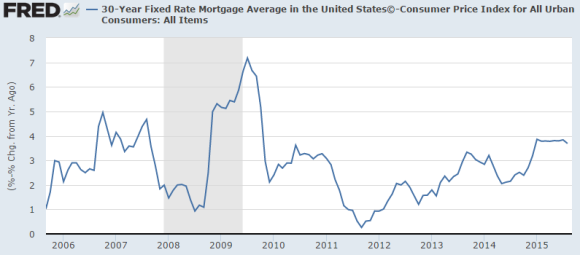Prices are very important in economics and finance for obvious reasons. And in modern economic models the price that is always most important is the price of money also known as the interest rate. The discussion over this price has really flared up in the last few months as the debate about the Federal Reserve and raising rates has picked up momentum. But what if it’s all misguided? What if interest rates are the wrong policy tool to focus on?
From an operational perspective the Federal Reserve controls an important interest rate. They control the price of money in the overnight market. As the monopoly supplier of reserves to the banking system the Fed is the price setter and not a price taker. But overnight rates are just one of many rates and while they’re important their price does not necessarily steer the future direction of the economy.
If we’ve learned one thing over the last 7 years it’s that reducing interest rates isn’t a very powerful policy mechanism. After all, one would think that 0% interest rates would be akin to “free money”. But interest rates really haven’t been as low as some people think. For instance, the rate that matters most to the housing market (arguably the most important asset market in the economy) has been pretty flat for most of the last 10 years:
And here’s the thing. Since the overnight rate is just a benchmark rate it has a rather imprecise impact on the rest of the economy. The fact that a bank can borrow in the overnight market for 0% does not have any meaningful impact on whether you can afford to buy a mortgage at 4%. And that’s the kicker. The Fed’s control of the short-term rate does not always translate into easing improvements at the long end of the curve structure. This is essentially Alan Greenspan’s great “conundrum”.
If we’ve learned anything over the last couple decades it’s that policy changes via the overnight rate are very imprecise and probably not as impactful as many think. But in many ways we focus on changes in the overnight rate as though they are world changing events. And in focusing so much on interest rates and treating the Fed like it has an Archimedean Lever over the economy, we lose sight of policies that might actually help us at times when we need it. When will we learn to stop focusing so much on policies that clearly aren’t as important as some would like to think?
Mr. Roche is the Founder and Chief Investment Officer of Discipline Funds.Discipline Funds is a low fee financial advisory firm with a focus on helping people be more disciplined with their finances.
He is also the author of Pragmatic Capitalism: What Every Investor Needs to Understand About Money and Finance, Understanding the Modern Monetary System and Understanding Modern Portfolio Construction.

